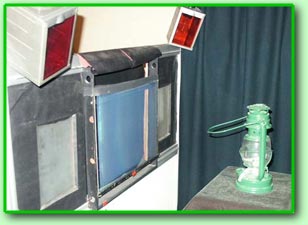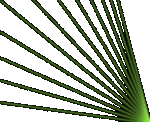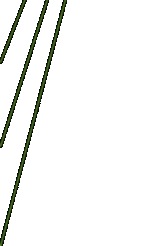|
18. Hologram
recording
So everything is ready for recording a hologram.
The laser was tested, the optical scheme was
adjusted, the object was set in the shooting
cabin. Recording the hologram is executed by
a nonactinic illumination to which the photographic
plates arenít sensitive. For the photographic
plates VRP (FPR) which are sensitive to green
light the red light is nonactinic.
At first we take a photographic plate from the
box and check were the emulsion layer is located
(see lesson 8).
 Then
we set the photographic plate into the frame,
see fig., so that the emulsion side is directed
to the object. The plate is inserted by the
lower face into the frame slot and the upper
face is closed by the black rubber tape so that
the reference beam doesnít get into it. By setting
the photographic plate you should be very careful
in order not to scratch occasionally the emulsion
layer and not to displace the object. If a portrait
is shot the customer has a possibility to look
at himself in a weak reflection from the photographic
plate and to sleek the hair or to correct position
of the head. Then we rise the pump voltage in
the supply unit of the laser up to the nominal
value. The starting button is connected to the
supply unit through the long cord therefore
itís possible to come to the cabin before shooting
and to control of the object position till the
latest moment. Itís especially important by
shooting domestic animals, which can involuntarily
move aside and so you should simply catch the
moment of the happiest position. If a complex
composition with a non-standard illumination
is shot at first a test hologram of small sizes,
e.g. 9x12 cm, should be recorded. During shooting
the plate can be simply held in the hand with
the upper face closed by a strip of paper or
by the plastic clamp. If everything is all right
we press the starting button and the laser emits
a short and powerful pulse of light. The hologram
has been recorded! By shooting portraits customers
often ask a question - is dangerous the laser
radiation for eyes or not. It's a serious question
but it is solved for a long time and the answer
to it is given in many recommendations and descriptions
of methods written for specialists working with
laser radiation. Safe levels of illumination
of the eye retina for the continuous and pulse
laser radiation have been determined and the
methods of calculation of the illumination levels
for different conditions have been developed.
For our setup with the laser energy of 1 Joule
and with a two-beam diffuse illumination of
the object and taking into account bright illumination
of the cabin by red lanterns (see fig.), the
illumination level of eyes is less than the
set safe level approximately by a factor of
ten. Red nonactinic light plays the important
role here - the pupil of the eye converges and
the level of illumination of the eye retina
by the laser radiation is considerably reduced.
--> Then
we set the photographic plate into the frame,
see fig., so that the emulsion side is directed
to the object. The plate is inserted by the
lower face into the frame slot and the upper
face is closed by the black rubber tape so that
the reference beam doesnít get into it. By setting
the photographic plate you should be very careful
in order not to scratch occasionally the emulsion
layer and not to displace the object. If a portrait
is shot the customer has a possibility to look
at himself in a weak reflection from the photographic
plate and to sleek the hair or to correct position
of the head. Then we rise the pump voltage in
the supply unit of the laser up to the nominal
value. The starting button is connected to the
supply unit through the long cord therefore
itís possible to come to the cabin before shooting
and to control of the object position till the
latest moment. Itís especially important by
shooting domestic animals, which can involuntarily
move aside and so you should simply catch the
moment of the happiest position. If a complex
composition with a non-standard illumination
is shot at first a test hologram of small sizes,
e.g. 9x12 cm, should be recorded. During shooting
the plate can be simply held in the hand with
the upper face closed by a strip of paper or
by the plastic clamp. If everything is all right
we press the starting button and the laser emits
a short and powerful pulse of light. The hologram
has been recorded! By shooting portraits customers
often ask a question - is dangerous the laser
radiation for eyes or not. It's a serious question
but it is solved for a long time and the answer
to it is given in many recommendations and descriptions
of methods written for specialists working with
laser radiation. Safe levels of illumination
of the eye retina for the continuous and pulse
laser radiation have been determined and the
methods of calculation of the illumination levels
for different conditions have been developed.
For our setup with the laser energy of 1 Joule
and with a two-beam diffuse illumination of
the object and taking into account bright illumination
of the cabin by red lanterns (see fig.), the
illumination level of eyes is less than the
set safe level approximately by a factor of
ten. Red nonactinic light plays the important
role here - the pupil of the eye converges and
the level of illumination of the eye retina
by the laser radiation is considerably reduced.
-->
|





